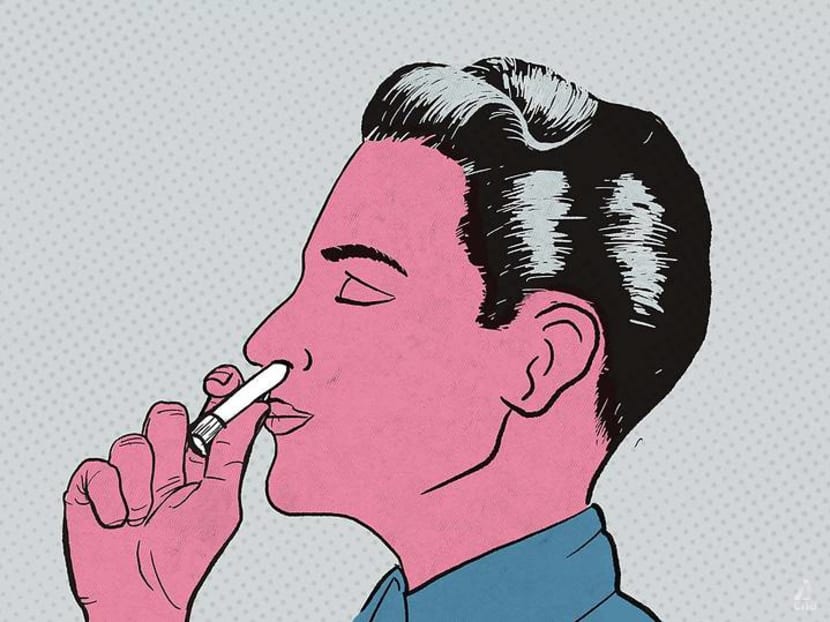Always sticking these into your nose? Why nasal inhalers can be bad for you
There’s more to this ‘uncle’ accessory than meets the eye (or nose). For one, the ingredients used in many inhalers can ironically be responsible for the persistent nose congestion.

(Art: Jasper Loh)
Many of us associate those white plastic tubes with rounded ends as the ultimate “uncle” accessory. Others simply can’t go a day without one wedged in the nostril. “Can’t breathe” or “nose is blocked” is their common refrain if you try to separate them from their nasal inhalers.
And during the “circuit breaker” period, you may even have noticed family members, who are already fans, sniffing their little tubes more than usual.
The reason: If you haven’t been cleaning your flat often, all that dust can trigger allergic rhinitis, which can cause more nasal obstruction.
“Allergic rhinitis can cause sinus and nasal congestion, and pain,” said Dr Lim Keng Hua, an ear, nose, throat (ENT) specialist at Mount Elizabeth Medical Centre’s Ear Nose Throat, Head & Neck Surgery clinic. “At night, the nasal congestion affects sleep, causes snoring and sometimes, sleep apnoea.”

Other allergies and having a sensitive nose can also make you more likely to suffer from nasal congestion, said Dr Leslie Koh, a consultant with Changi General Hospital’s Otorhinolaryngology Department.
HOW DO NASAL INHALERS WORK?
So what goes into these tiny dispensers of cool, minty vapours anyway? Mostly, camphor, menthol and/or eucalyptus oils, said Dr Lim.
Although these oils make breathing feel easier, like there’s an increased sense of airflow through the nose, that isn’t what’s actually happening, though.
“On the contrary, the administration of menthol via nasal inhaler has been shown to cause nasal congestion,” said Dr Lim, who explained that the blocked sensation “might be due to an irritant action”.
Furthermore, “excessive amounts of menthol can cause vertigo, dizziness, agitation, abnormal eye movements, unsteady gait, hallucinations, lethargy, and even coma,” cautioned Dr Koh.

Camphor, also deemed as natural, isn’t to be trifled with either. “Excessive amounts of camphor can cause irritation in the mouth and throat, nausea, vomiting and abdominal pain. Agitation and seizures have also been described as a sign of menthol and camphor poisoning,” he said.
Besides plant-based oils, some nasal inhalers may also contain powerful decongestants such as oxymetazoline, pseudoephedrine or ephedrine, said Dr Lim. These decongestants are not without their downsides, too.
“They are very effective in relieving nasal congestion but their prolonged use can damage the nasal tissue, resulting in a rebound phenomenon, that is, the nose becomes even more congested,” said Dr Lim.
“Other side effects include an increase in runny nose, fast heartbeat, headache, dizziness, lightheadedness, nervousness and trouble sleeping.”
To be safe, don't use the inhaler more than three times a day, and don't use it for longer than one to two weeks, said Dr Koh.
“If you need them daily for more than a week, you should consult your doctor and treat the underlying cause of nasal congestion,” said Dr Lim.
CAN YOU BE ADDICTED TO YOUR INHALER?
There aren’t addictive ingredients in the over-the-counter nasal inhalers sold in Singapore, said Dr Koh. “However, overusing the product may develop into a habit, especially if the patient feels that he derives some physical benefit from it.”
But how bad can nasal inhalers be? “Some develop rhinitis medicamentosa, a medical condition whereby the mucosa lining of the nose is damaged, replaced by fibrotic tissue that is no longer contractile,” said Dr Lim.
“As such, the nose is mostly blocked, and is only relieved momentarily with nasal decongestants. Some have worsened signs such as a runny nose, crusting and a foul smell.”

He recalled a patient who had been continuously using the nasal inhaler for five years. It started when she developed pregnancy rhinitis and needed to relieve the severe nasal congestion.
“It was almost like helping someone quit an addiction. You need to ‘cold turkey’ them," he said. “It took two months to wean her off the effect of nasal decongestants and treat her without surgery.”
In addition, the patient was put on a course of oral steroids, intranasal steroidal spray, saline rinse or douching, and decongestant-free antihistamine, he said.
OTHER WAYS OF UNBLOCKING YOUR NOSE
There are other ways to “unblock” your nose. If it’s a chronic situation, meaning the congestion has persisted for a long time or constantly recurs, you might want to see the doctor for possible allergies or a nose sensitivity, said Dr Koh.

“Patients with allergies may require intranasal steroids, which could help significantly with the nasal congestion. In the worst-case scenario, some patients may actually have tumours of the nasal cavity and sinuses. Hence, a consultation with a doctor would be helpful,” he said.
If the congestion is recent, perhaps caused by an upper respiratory tract infection such as a cold, Dr Koh suggests over-the-counter nasal sprays containing oxymetazoline. But limit the use of these decongestants to no more than three times a day, and a continuous duration of five to seven days.
There are also oral decongestant medications, as well as combination antihistamine-decongestant medications, said Dr Koh.
These can also be used by patients with acute nasal congestion. However, they come with side effects, especially in the elderly, including agitation and acute urinary retention, he cautioned.





